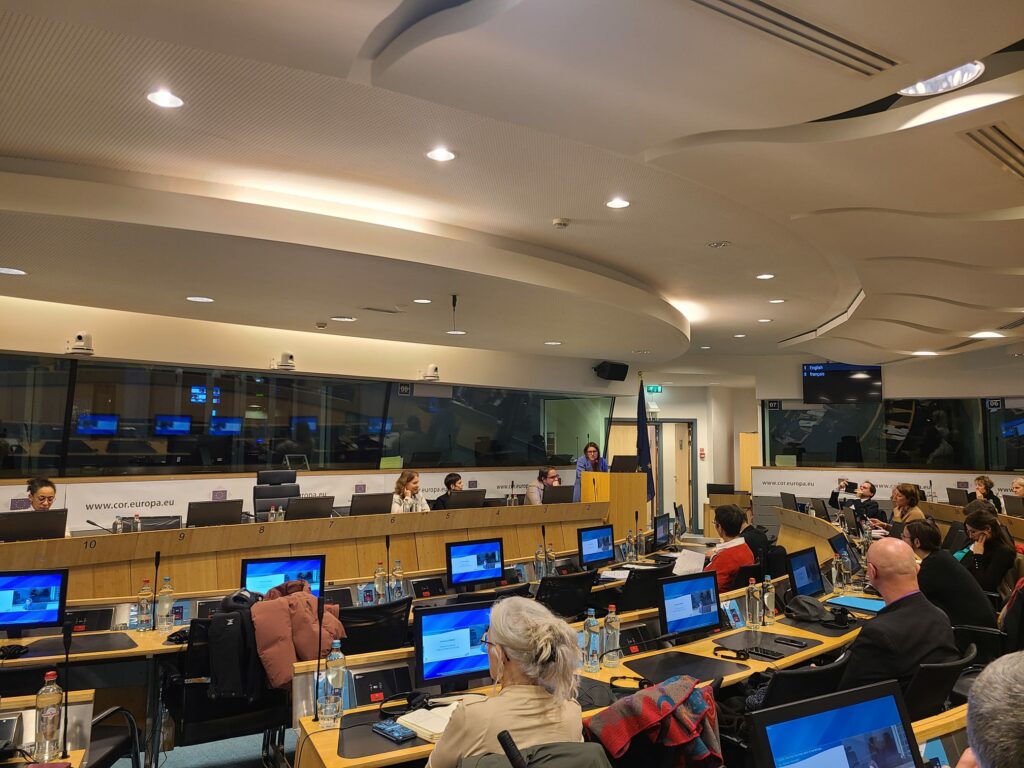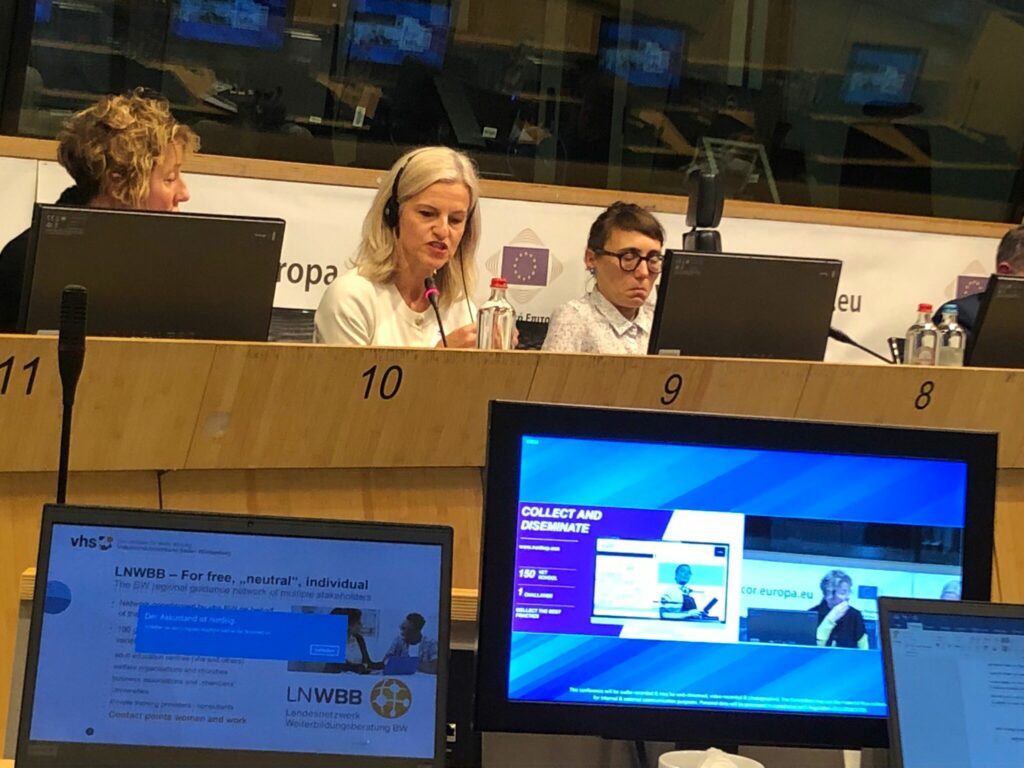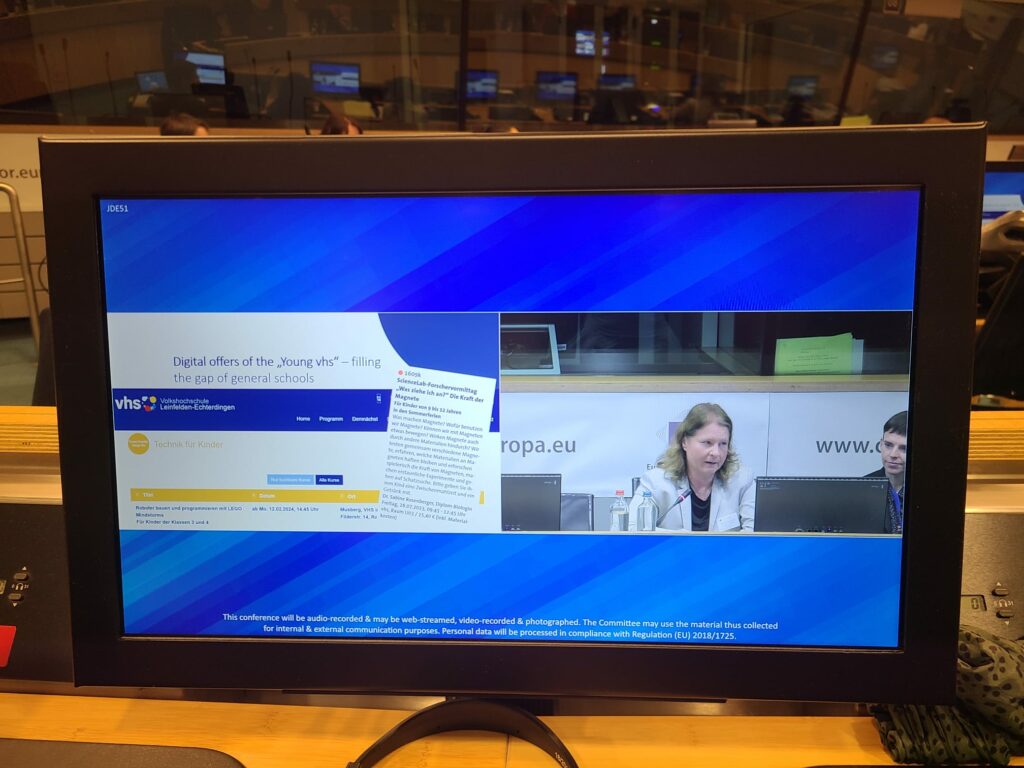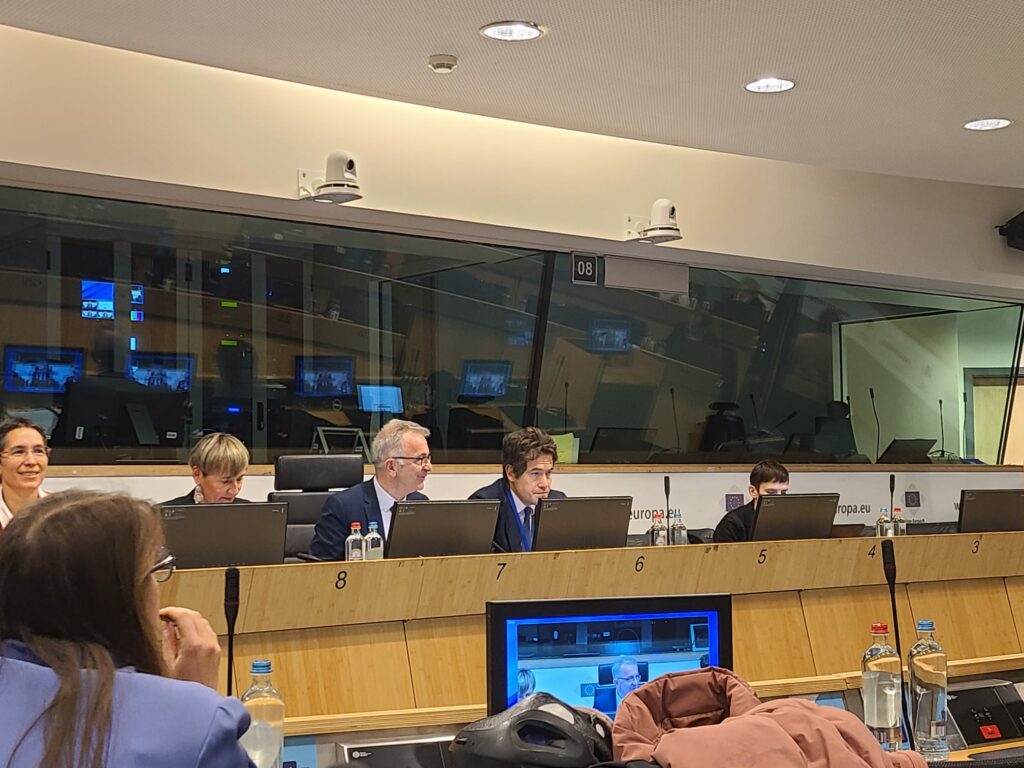Equality between Women and Men in the Digital Sector: Regions Innovate!
29/11/2023

On November 27, the Centre-Val de Loire region, an EARLALL Member, hosted a session at the Committee of the Regions in Brussels entitled ‘Equality between Women and Men in the Digital Sector: Regions Innovate!’ The conference aimed to showcase regional examples, including Baden-Württemberg (Germany) and Basque Country (Spain) from the EARLALL network, demonstrating measures taken to ensure gender equality in the digital sector within the context of European initiatives in this field.
François Bonneau, President of Centre-Val de Loire Region, along with the Vice-President for Equality and the Vice-President for Democracy, opened the session. They emphasised that achieving gender equality in the digital sector is as much about social justice as it is about economic efficiency. Despite the significant opportunities presented by the digital sector in various regions, such as Centre-Val de Loire, there exists a shortage of key competences within the workforce. Hence, it is imperative to harness the competency resources of women in this context.
Lanfranco Fanti, advisor to the cabinet of Helena Dali, European Commissioner for Equality, provided an overview of the European Commission’s preparations regarding equality and the digital sector. Initiatives mentioned included the European Care Strategy and the Gender Balance on Corporate Boards. He concluded that “men need to be engaged too. Gender is a political subject, and it requires the involvement of everyone to foster fairness.”
The discussions transitioned to the first roundtable titled “How can we raise awareness among girls and women about careers in the digital field?” Francesca Maltauro, Deputy-Head of Unit in EAC.C4 Digital Education, discussed initiatives from the Council, including the Council Recommendation on key enabling factors for successful digital education and training. Solène Moutier, Education Project Manager at EIT Raw Materials, presented the ‘Girls Go Circular’ project, an EIT Innovation Community initiative focusing on girls aged 15-19. This project combines circular economy education with enhancing their digital skills through an online platform.
Regarding regional efforts to attract women and girls to the digital sector, best practices were shared from EARLALL members Centre-Val de Loire region and Baden-Württemberg. Matthieu Vallée, Head of the Guidance Department, Centre-Val de Loire Region, highlighted that 76 percent of high school students in the region perceive IT as a masculine profession. The region has implemented various initiatives to counteract such inequalities, notably through their guidance programs, which include:
- Professionalization of guidance partners
- Strengthening information and altering mindsets among parents
- Organizing events to promote digital jobs for women
- Taking responsibility for actions dedicated to girls
- Implementing measures for balanced employment return rates
Andrea Bernert-Bürkle, EU Project Manager at vhs BW, Baden-Württemberg Adult Education Association, shared initiatives like the “Young vhs” scheme, providing non-formal digital education to children. The association also conducts summer camps and after-school classes on digital skills. Additionally, the Ministry of Economy in Baden-Württemberg supports the “Digital Girls” campaign, hosting camps aimed at enhancing digital skills for girls and a CyberMentor program connecting them with women professionals in IT and digital fields.
During the roundtable on “Leadership Support: What tools are needed to assist women in taking on leadership roles?” June Lowery-Kingston, Head of Unit at DG Connect (CNECT.G.3), emphasized the underrepresentation of women in IT and advocated for a more diverse workforce to ensure inclusivity in IT and digital services. She highlighted ongoing initiatives of the European Commission, including EU Code Week. Stéphane Ouaki, Head of Department at the European Innovation Council and the Executive Agency for SMEs (EISMEA), discussed Women TechEU, aimed at supporting women in establishing their tech start-ups.
From the EARLALL network, Esther Elexgarai, Executive Director of the Iurreta Integrated Center, and Josune Irazábal, Digital Promoter of the Miguel Altuna Integrated Center (Basque Country), discussed strategies to address the low participation of women in STeAM industrial training in their region. They emphasized the significance of self-confidence as the first step towards leadership, mentioning initiatives like SomosLasFP to listen to the voices of girls and women. Additionally, they highlighted the neskUP! Initiative to amplify the voices of girls aspiring to work in these sectors and provide a self-diagnostic tool for SMEs to evaluate gender equality.



As for Catherine Lenoble from the Gender Equality Working Group of the CRNum (Regional Digital Council, Centre-Val de Loire), she stressed the need for guidance services to adopt a gendered approach. Her non-profit association provides a network of engagement and ambassadors to work toward this goal. Andrea Bernert-Bürkle, EU Project Manager at vhs BW, presented the network’s guidance centers, including specific centers for women, and a Women and Work network supporting women’s upskilling.
Finally, Snezhina Petrova from the European Executive Agency for Education and Culture (EACEA): Erasmus+ and “Citizenship, Equality, Rights and Values,” concluded the conference by discussing that the statistics show clearly the disparities between men and women in the digital sector, and to combat these statistics we need to encourage STEP education, promote innovative teaching and learning models and advocate for more female role models. Building on these thoughts, the President of Centre Val de Loire region, François Bonneau thanked the participants for sharing their inspiring practices. He expressed hope that dialogue on this issue continues, ensuring European regions can continue to show and work on the equality between men and women in the sector, ensuring liberation of stereotypes and key skill development.
Equality between Women and Men in the Digital Sector: Regions Innovate!
On November 27, the Centre-Val de Loire region, an EARLALL Member, hosted a session at the Committee of the Regions in Brussels entitled ‘Equality between Women and Men in the Digital Sector: Regions Innovate!’ The conference aimed to showcase regional examples, including Baden-Württemberg (Germany) and Basque Country (Spain) from the EARLALL network, demonstrating measures taken to ensure gender equality in the digital sector within the context of European initiatives in this field.
François Bonneau, President of Centre-Val de Loire Region, along with the Vice-President for Equality and the Vice-President for Democracy, opened the session. They emphasised that achieving gender equality in the digital sector is as much about social justice as it is about economic efficiency. Despite the significant opportunities presented by the digital sector in various regions, such as Centre-Val de Loire, there exists a shortage of key competences within the workforce. Hence, it is imperative to harness the competency resources of women in this context.
Lanfranco Fanti, advisor to the cabinet of Helena Dali, European Commissioner for Equality, provided an overview of the European Commission’s preparations regarding equality and the digital sector. Initiatives mentioned included the European Care Strategy and the Gender Balance on Corporate Boards. He concluded that “men need to be engaged too. Gender is a political subject, and it requires the involvement of everyone to foster fairness.”
The discussions transitioned to the first roundtable titled “How can we raise awareness among girls and women about careers in the digital field?” Francesca Maltauro, Deputy-Head of Unit in EAC.C4 Digital Education, discussed initiatives from the Council, including the Council Recommendation on key enabling factors for successful digital education and training. Solène Moutier, Education Project Manager at EIT Raw Materials, presented the ‘Girls Go Circular’ project, an EIT Innovation Community initiative focusing on girls aged 15-19. This project combines circular economy education with enhancing their digital skills through an online platform.
Regarding regional efforts to attract women and girls to the digital sector, best practices were shared from EARLALL members Centre-Val de Loire region and Baden-Württemberg. Matthieu Vallée, Head of the Guidance Department, Centre-Val de Loire Region, highlighted that 76 percent of high school students in the region perceive IT as a masculine profession. The region has implemented various initiatives to counteract such inequalities, notably through their guidance programs, which include:
- Professionalization of guidance partners
- Strengthening information and altering mindsets among parents
- Organizing events to promote digital jobs for women
- Taking responsibility for actions dedicated to girls
- Implementing measures for balanced employment return rates
Andrea Bernert-Bürkle, EU Project Manager at vhs BW, Baden-Württemberg Adult Education Association, shared initiatives like the “Young vhs” scheme, providing non-formal digital education to children. The association also conducts summer camps and after-school classes on digital skills. Additionally, the Ministry of Economy in Baden-Württemberg supports the “Digital Girls” campaign, hosting camps aimed at enhancing digital skills for girls and a CyberMentor program connecting them with women professionals in IT and digital fields.
During the roundtable on “Leadership Support: What tools are needed to assist women in taking on leadership roles?” June Lowery-Kingston, Head of Unit at DG Connect (CNECT.G.3), emphasized the underrepresentation of women in IT and advocated for a more diverse workforce to ensure inclusivity in IT and digital services. She highlighted ongoing initiatives of the European Commission, including EU Code Week. Stéphane Ouaki, Head of Department at the European Innovation Council and the Executive Agency for SMEs (EISMEA), discussed Women TechEU, aimed at supporting women in establishing their tech start-ups.
From the EARLALL network, Esther Elexgarai, Executive Director of the Iurreta Integrated Center, and Josune Irazábal, Digital Promoter of the Miguel Altuna Integrated Center (Basque Country), discussed strategies to address the low participation of women in STeAM industrial training in their region. They emphasized the significance of self-confidence as the first step towards leadership, mentioning initiatives like SomosLasFP to listen to the voices of girls and women. Additionally, they highlighted the neskUP! Initiative to amplify the voices of girls aspiring to work in these sectors and provide a self-diagnostic tool for SMEs to evaluate gender equality.
As for Catherine Lenoble from the Gender Equality Working Group of the CRNum (Regional Digital Council, Centre-Val de Loire), she stressed the need for guidance services to adopt a gendered approach. Her non-profit association provides a network of engagement and ambassadors to work toward this goal. Andrea Bernert-Bürkle, EU Project Manager at vhs BW, presented the network’s guidance centers, including specific centers for women, and a Women and Work network supporting women’s upskilling.
Finally, Snezhina Petrova from the European Executive Agency for Education and Culture (EACEA): Erasmus+ and “Citizenship, Equality, Rights and Values,” concluded the conference by discussing that the statistics show clearly the disparities between men and women in the digital sector, and to combat these statistics we need to encourage STEP education, promote innovative teaching and learning models and advocate for more female role models. Building on these thoughts, the President of Centre Val de Loire region, François Bonneau thanked the participants for sharing their inspiring practices. He expressed hope that dialogue on this issue continues, ensuring European regions can continue to show and work on the equality between men and women in the sector, ensuring liberation of stereotypes and key skill development.




